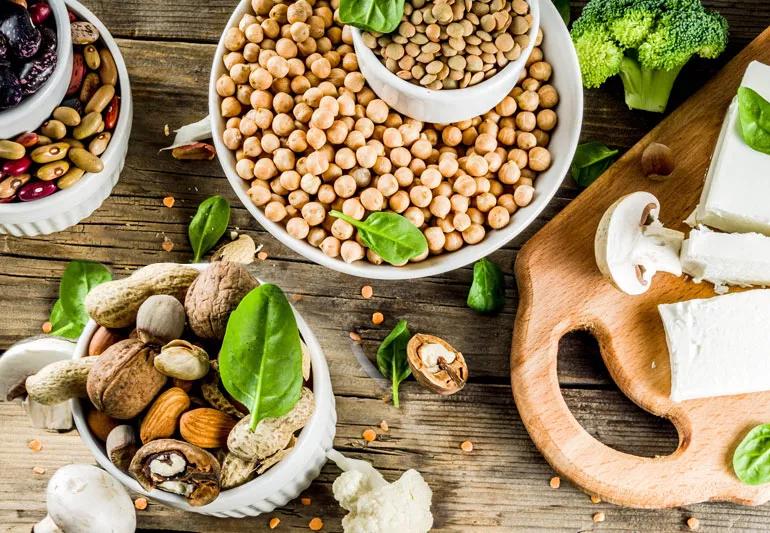Get the right amount from the best sources

Image content: This image is available to view online.
View image online (https://assets.clevelandclinic.org/transform/b98ace7f-4a1a-416b-9159-2a3059078c86/proteinSources-1127302995-770x533-1_jpg)
natural protein sources
Protein is essential to our health and wellness. This slow-burning nutrient takes longer to digest, so it keeps you feeling full: good news for people trying to lose weight. It’s also a champion for your muscles, helping your body build and maintain them.
Advertisement
Cleveland Clinic is a non-profit academic medical center. Advertising on our site helps support our mission. We do not endorse non-Cleveland Clinic products or services. Policy
Another great thing about protein is that it’s a thermogenic, so it helps your metabolism. This means that it creates a slight calorie burn as it’s digested. When compared to carbohydrate rich foods, protein has a greater thermogenic effect. Think of it as giving your digestive system a good, hard run.
But do you know how much protein you need and what the best sources are? Registered dietitian Kate Patton, MEd, RD, CSSD, LD, discusses six tips to help you harness true protein-power.
Protein is made up of essential and non-essential amino acids. A complete protein source is one that contains all nine essential amino acids to support human dietary needs.
Not only does a complete protein contain all essential amino acids, but it also contains them in perfect proportion in terms of biological function. Great examples include whey (dairy sources), lean meat, egg whites and soy.
Protein should represent about 10 to 35% of your daily calories, depending on your overall health and activity level. The average healthy adult should have .8-1.0 g/kg of protein each day. This means that an average woman weighing 150 lbs. should aim for 54 to 68 grams of protein each day. It’s also best to eat a consistent amount of protein throughout each day rather than load up at one meal and go without for other meals. Your body loves consistency, especially in protein intake.
Advertisement
We used to say that each meal had to be balanced between complete and incomplete protein sources, but that’s not necessary. What’s most important is that your body gets balanced nutrition over the course of the day, according to studies cited by the Centers for Disease Control.
This means that the proteins you get from animal products are the most easily absorbed and used by your body. For instance, 20 grams of protein from eggs deliver more of a protein punch than the same quantity of protein from plant sources. This doesn’t mean you can’t get the protein you need from non-animal sources. It just means that if you eat protein from animal sources, your body can more easily harness it.
Other great sources of protein are legumes (dried beans and peas), quinoa, nuts, seeds and soy products like tofu, tempeh and edamame.
If you don’t like other protein-rich foods, protein powder is great, especially if you’re on the go. But be careful not to use protein powder in addition to a meal to avoid gaining weight. Use it on its own as a post workout recovery drink or as a quick meal replacement.
Advertisement

Sign up for our Health Essentials emails for expert guidance on nutrition, fitness, sleep, skin care and more.
Learn more about our editorial process.
Advertisement
Pick bell peppers to help fight cancer, memory decline and joint pain
The tropical fruit is a good source of antioxidants and vitamin C
High amounts of cholesterol and saturated fat in red meat may be linked to heart disease
The leaves and pods from this tree are rich in essential nutrients
This starchy root vegetable is a staple in many global cuisines — but it has to be prepared correctly, or it can cause serious concerns
These delicate green sprouts can give you an extra dose of vitamin K and other nutrients — but they’re not safe for everyone
Edamame, lentils and chicken breast are good sources of protein
Eating this root vegetable can help support your eye, heart and brain health
Prioritize your health by managing stress, strengthening your social connections and getting quality sleep
Bolsters, blankets, pillows and blocks can offer extra support, stability and comfort
Allergies, postnasal drip, asthma or reflux could be to blame for a cough that won’t quit